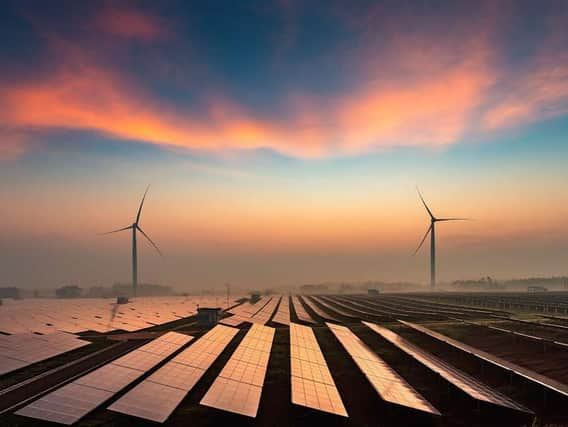Norstar boss says clean energy is ‘immune to pandemic’


Easingwold-based Norstar said that clean energy has defied the pandemic downturn which has hit all other areas of the power sector.
The firm said that the global energy sector was “experiencing its worst year since the Second World War”.
Advertisement
Hide AdAdvertisement
Hide AdHowever, renewable power is the one area that is bucking this trend and 90 per cent of global energy growth is coming from renewables.
Rufus Salter, director of Easingwold-based Norstar, said: “It has been reliably reported that the impact of coronavirus on the industry is seven times worse than that of the global financial crash earlier this century.
“Renewable power is defying the difficulties caused by the pandemic, showing robust growth while others fuels struggle.
“The resilience and positive prospects of the sector are clearly reflected by continued strong appetite from investors – and the future looks even brighter with new capacity additions on course to set fresh records this year and next.”
Advertisement
Hide AdAdvertisement
Hide AdNorstar recently teamed up with leading global counterpart, European Energy, to deliver green energy projects in the UK. Together the two firms are identifying and developing suitable sites to promote the green energy revolution across the country.
European Energy, which is headquarters are in Copenhagen, is one of the world’s largest developers and operators of solar farms with 845 sites across the globe.
Norstar currently has over a dozen solar farms across the UK in varying stages of development and is actively looking to add more to its portfolio.
Ideally, these farms will be installed and commissioned on agricultural sites of 50 acres or more and leased for 30 years.
Advertisement
Hide AdAdvertisement
Hide AdMr Salter said: “Green energy is an idea whose time has finally come.
"The Government has recently unveiled its Energy White Paper with a bold £4bn plan, aiming to eradicate the UK’s contribution to climate change by 2050.
“This is exactly the boost that the UK’s burgeoning green energy industry needs and it will create sustainable jobs, especially needed in Yorkshire and the North East, as well as substantially reducing carbon dioxide emissions across the country.”
Mr Salter also drew attention to a new International Energy Agency (IEA) report that stated that China and the US will drive new additions of renewables this year to a record level of almost 200 GW.
Advertisement
Hide AdAdvertisement
Hide AdThis rise, representing almost 90 per cent of the total expansion in overall power capacity globally, is led by wind, hydropower and solar PV. Wind and solar additions are set to jump by 30 per cent in both the US and China as developers rush to take advantage of expiring incentives.
However, the report flags that “even stronger growth is to come”. India and the European Union will be the driving forces behind a record expansion of global renewable capacity additions of nearly 10 per cent next year – the fastest growth since 2015 – according to the report.
This is the result of the commissioning of delayed projects where construction and supply chains were disrupted by the pandemic, and growth in markets where the pre-Covid project pipeline was robust.
The IEA highlights that in the first 10 months of this year, China, India and the European Union have driven auctioned renewable power capacity worldwide 15 per cent higher than in the same period last year – a new record that shows expectations of strong demand for renewables over the medium and long term.
Advertisement
Hide AdAdvertisement
Hide AdAt the same time, shares of publicly listed renewable equipment manufacturers and project developers have been outperforming most major stock market indices and the overall energy sector. By October, shares of solar companies worldwide had more than doubled in value
from December 2019.
Norstar said that critical factors influencing the pace of deployment will be policy decisions in key markets like China, and effective support for rooftop solar PV, which has been impacted by the crisis as households and businessesreprioritised investments.
Total wind and solar PV capacity is on course to surpass natural gas in 2023 and coal in 2024.
Driven by rapid cost declines, annual offshore wind additions are set to surge, accounting for one fifth of the total wind market in 2025.
Advertisement
Hide AdAdvertisement
Hide AdThe growing capacity will take the amount of renewable electricity produced globally to new heights.
In 2025, renewables are set to become the largest source of electricity generation worldwide, ending coal’s five decades as the top power provider.
Comment Guidelines
National World encourages reader discussion on our stories. User feedback, insights and back-and-forth exchanges add a rich layer of context to reporting. Please review our Community Guidelines before commenting.